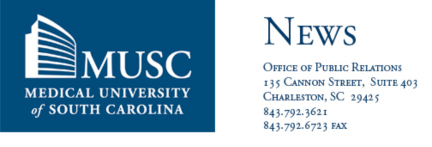
August 10, 2011
CHARLESTON -- A sluggish economy and pressure to reduce federal research funding failed to deprive the Medical University of South Carolina (MUSC) of a record amount of research funding this fiscal year. Total grant support from outside sources topped $238 million. Research awards surpassed the $200 million mark for the fourth consecutive year, with a $4.4 million dollar increase over the prior year. The record funding includes more than $117 million from the National Institutes of Health.
"The continued growth of the research programs in the face of general economic challenges is simply amazing and is an important contributor to our regional economy. We have an outstanding research team at MUSC," said Stephen M. Lanier, Ph.D., MUSC associate provost for research and pharmacology professor.
Biomedical research is becoming an important part of the regional economy and is one of the strategic areas for growth in the plans of the Charleston Regional Development Alliance. Research funding at MUSC creates new jobs in the region as research teams move to the area and expand their programs by hiring staff.
Six new SmartState Endowed Chairs joined MUSC this past year as part of the Centers of Economic Excellence Program (http://www.sccoee.org/) and relocated their internationally recognized research programs to Charleston.
"In the highly competitive market for scientists, the SmartState Endowed Chairs program has given South Carolina an edge," said Ray Greenberg, M.D., Ph.D., president of MUSC. "The General Assembly created this program, and it has proven to be a model for growing the knowledge-based economy of our state."
Many of the new recruits are attracted by the world-class research programs already at MUSC. One such recognized program is led by Drs. Yusuf Hannun and Lina Obeid and focuses on the relationship between lipid molecules and cancer development. This program is supported by major grants from the National Institutes of Health, charting new territory in the areas of cancer diagnostics and therapeutics that led to the formation of a new SmartState SC Center of Economic Excellence.
The Charleston Innovation Center, an incubator for new companies developed through a partnership with the South Carolina Research Authority, the City of Charleston and MUSC, continues to attract companies and research teams to the region and currently serves as home for eight biopharmaceutical and biotechnology companies.
The upcoming year will witness the opening of two new research buildings (Drug Discovery Building and Bioengineering Building) in the heart of the MUSC campus, both of which were supported in part by the Research University Infrastructure Act passed by the General Assembly in 2004. These buildings will be a key platform for further growth of research programs and include advanced technology resources, state-of-the-art laboratories and conference facilities. Of particular importance, the buildings will have faculty from Clemson University and the University of South Carolina working side-by-side with MUSC scientists.
"Such collaborative initiatives will give South Carolina a competitive advantage and will lead to the development of new technologies and therapies that will benefit the broad community we serve," noted Lanier.
About MUSC
Founded in 1824 in Charleston, The Medical University of South Carolina is the oldest medical school in the South. Today, MUSC continues the tradition of excellence in education, research, and patient care. MUSC educates and trains more than 3,000 students and residents, and has nearly 11,000 employees, including 1,500 faculty members. As the largest non-federal employer in Charleston, the university and its affiliates have collective annual budgets in excess of $1.7 billion. MUSC operates a 750-bed medical center, which includes a nationally recognized Children's Hospital, the Ashley River Tower (cardiovascular, digestive disease, and surgical oncology), and a leading Institute of Psychiatry. For more information on academic information or clinical services, visit www.musc.edu or www.muschealth.com.
#####